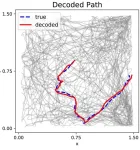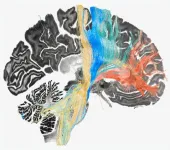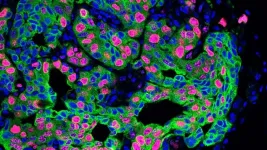(Press-News.org) TAMPA, Fla. — Hurricanes and other extreme weather events pose immediate threats to life and property and have long-lasting impacts on health outcomes, particularly for cancer survivors. In a mini-review published today in Cancer Epidemiology, Biomarkers & Prevention, a journal from the American Association for Cancer Research, Moffitt Cancer Center researchers shed light on the significant gaps in understanding and addressing the effects of hurricanes and extreme weather events on biological, psychosocial and clinical outcomes among cancer survivors.
Researchers provide a comprehensive overview of the current state of the literature, highlighting key findings from past extreme weather events such as hurricanes Ian, Maria, Sandy and Katrina. These events have exposed the vulnerabilities of cancer survivors, leading to disruptions in cancer care, exacerbation of psychosocial distress and disparities in health outcomes. It also revealed the need for better tools and systematic approaches to study these impacts. Currently, there is no standardized way to collect information from patients in the immediate aftermath of an extreme weather event. Instead, the information comes from retrospective self-report surveys.
Lisa Gudenkauf, Ph.D., M.P.H., lead author of the mini-review and research scientist in the Department of Health Outcomes and Behavior at Moffitt, emphasized the urgent need for further research and interventions in this critical area.
“Cancer survivors face unique challenges during and after extreme weather events, including disruptions in treatment, increased stress levels and disparities in access to care. It is imperative that we address these challenges to improve the long-term outcomes and quality of life for cancer survivors.” Gudenkauf said.
The mini-review also calls for action from health care systems, public health leaders and research organizations to develop comprehensive strategies for mitigating the impact of extreme weather events on cancer survivors. Suggested strategies include implementing interventions to help survivors cope with stress, enhancing health care system preparedness and addressing social determinants of health that contribute to disparities in outcomes.
“Our goal is to inform future research and policy initiatives that can lead to tangible improvements in the lives of cancer survivors affected by extreme weather events,” explained Brian Gonzalez, Ph.D., study author and associate center director of Research Diversity and Workforce Development.
This work was supported by the National Cancer Institute (R01 CA242742) and the U.S. Department of Defense (W81XWH-20-1-0126).
About Moffitt Cancer Center
Moffitt is dedicated to one lifesaving mission: to contribute to the prevention and cure of cancer. The Tampa-based facility is one of only 56 National Cancer Institute-designated Comprehensive Cancer Centers, a distinction that recognizes Moffitt’s scientific excellence, multidisciplinary research, and robust training and education. Moffitt’s expert nursing staff is recognized by the American Nurses Credentialing Center with Magnet® status, its highest distinction. With more than 9,000 team members, Moffitt has an economic impact in the state of $2.4 billion. For more information, call 1-888-MOFFITT (1-888-663-3488), visit MOFFITT.org, and follow the momentum on Facebook, Twitter, Instagram and YouTube.
###
Lisa M. Gudenkauf, Cassandra A. Hathaway, Judith E. Carroll, Brent J. Small, Xiaoyin Li, Aasha I. Hoogland, Eida Castro, Guillermo N. Armaiz-Pena, Laura B. Oswald, Heather SL. Jim, Shelley S. Tworoger, Brian D. Gonzalez; Inequities in the Impacts of Hurricanes and other Extreme Weather Events for Cancer Survivors. Cancer Epidemiol Biomarkers Prev 2024; https://doi.org/10.1158/1055-9965.EPI-23-1029
END
Researchers have paired a deep learning model with experimental data to “decode” mouse neural activity. Using the method, they can accurately determine where a mouse is located within an open environment and which direction it is facing just by looking at its neural firing patterns. Being able to decode neural activity could provide insight into the function and behavior of individual neurons or even entire brain regions. These findings, publishing February 22 in Biophysical Journal, could also inform the design of intelligent machines that currently ...
A large language model (LLM) artificial intelligence (AI) system can match, or in some cases outperform, human ophthalmologists in the diagnosis and treatment of patients with glaucoma and retina disease, according to research from New York Eye and Ear Infirmary of Mount Sinai (NYEE).
The provocative study, published February 22, in JAMA Ophthalmology, suggests that advanced AI tools, which are trained on vast amounts of data, text, and images, could play an important role in providing decision-making support to ophthalmologists in the diagnosis and management of cases involving glaucoma and retina ...
"Trans masculine people are people born female but do not identify as such, for example they feel male, gender fluid or non-binary. Our examination of their ovarian tissue shows that 33% of them show signs of recent ovulation, despite being on testosterone and no longer menstruating," says Joyce Asseler, PhD candidate at Amsterdam UMC.
Trans masculine people often use hormone treatment with testosterone to masculinize physically. This hormone usually stops them from menstruating. In that ...
A new study led by investigators from Mass General Brigham demonstrated the use of deep brain stimulation (DBS) to map a ‘human dysfunctome’ — a collection of dysfunctional brain circuits associated with different disorders. The team identified optimal networks to target in the frontal cortex that could be used for treating Parkinson’s disease, dystonia, obsessive compulsive disorder (OCD) and Tourette's syndrome. Their results are published in Nature Neuroscience.
“We were able to use brain stimulation to precisely identify and target circuits for the optimal treatment of four different ...
About The Study: This study found that all-sites cancer incidence in the U.S. was significantly lower than expected in March through December 2020, with 134,395 potentially undiagnosed cancer cases. The overall and differential findings can be used to inform where the health care system should be looking to make up ground in cancer screening and detection.
Authors: Krystle A. Lang Kuhs, Ph.D., M.P.H., of the University of Kentucky in Lexington, is the corresponding author.
To access the embargoed study: Visit our For The Media website at this link https://media.jamanetwork.com/
(doi:10.1001/jamaoncol.2023.6969)
Editor’s ...
About The Study: The results of this study suggest a high burden of refractive error–associated correctable refractive error in African American adults, making it the leading cause of visual impairment in this population. Providing universal coverage for vision care and prescription glasses is an affordable and achievable health care intervention that could reduce the burden of visual impairment in African American adults by over two-thirds and likely raise the quality of life and work productivity, ...
About The Study: Vision impairment was associated with several psychosocial outcomes, including symptoms of depression and anxiety and social isolation in this study including 2,822 U.S. adults age 65 and older. These findings provide evidence to support prioritizing research aimed at enhancing the health and inclusion of people with vision impairment.
Authors: Pradeep Y. Ramulu, M.D., M.H.S., Ph.D., of the Johns Hopkins University School of Medicine in Baltimore, is the corresponding author.
To access the embargoed ...
Stress is inevitable. But too much of it can be terrible for our health. Chronic stress can increase our risk for heart disease and strokes. It may also help cancer spread. How this works has remained a mystery—a challenge for cancer care.
Xue-Yan He, a former postdoc in Cold Spring Harbor Laboratory (CSHL) Adjunct Professor Mikala Egeblad’s lab, says, “Stress is something we cannot really avoid in cancer patients. You can imagine if you are diagnosed, you cannot stop thinking about the disease or insurance ...
Over 134,000 cancer cases went undiagnosed in the U.S. during the first 10 months of the COVID-19 pandemic, according to a new University of Kentucky Markey Cancer Center study.
The report published in JAMA Oncology Feb. 22 provides the first estimates of missed cancer diagnoses in 2020 using nationwide surveillance data.
Researchers have expected impacts to cancer detection as a result of delayed screenings and missed health care appointments due to the COVID-19 pandemic, but the extent of this impact had not been quantified until ...
New research at the Roy Blunt NextGen Precision Health building has discovered a potential treatment for an underlying cause of cardiovascular disease in people with Type 2 diabetes.
More than 30 million Americans live with Type 2 diabetes. One common feature of diabetes is the hardening and inflexibility of blood vessels caused by damage to the endothelial cells in the vascular system. Over time, this can lead to the development and progression of cardiovascular disease, which is the number one cause of death in diabetics. Because endothelial dysfunction is causally linked to cardiovascular disease, there is a considerable ...


